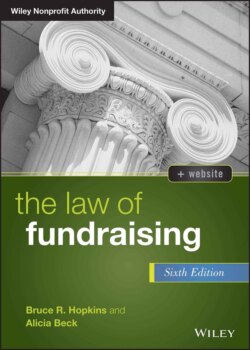Читать книгу The Law of Fundraising - Bruce R. Hopkins - Страница 93
§ 3.24 PROSPECT OF LAW CHANGES
ОглавлениеThe Senate Finance Committee, in the course of preparing federal tax legislation to further regulate the charitable sector, asked the Independent Sector to submit its recommendations as to law changes. The Independent Sector in turn convened a Panel on the Nonprofit Sector, which submitted comments as to the proposed legislation in mid-2005. Draft recommendations were submitted to the Panel from its work groups on September 22, 1995. One set of these draft recommendations pertained to the charitable solicitation process.82
These draft recommendations observe that most public charities must solicit funds from the public in support of their programs. Charitable solicitation activities vary greatly from charity to charity, depending on factors such as the size and stage of an organization, the needs and resources within the community involved, and the judgment of an organization's governing board as to how best to fund its charitable activities in the short and long term. There also is recognition of the fact that charities may rely on for-profit professional fundraisers and consultants for assistance.
In stating the problem to which these recommendations relate, there is the further observation that state regulators, and to a lesser extent the IRS and the Federal Trade Commission (FTC), have long been concerned about fraudulent solicitations and about professional solicitors who raise charitable funds primarily for their own benefit. They are also concerned that, when charities pay large fees to professional fundraisers, they may receive only a small percentage of the total amount raised. Recognizing that there are legitimate reasons why a charity may conduct a costly solicitation campaign that results in little net revenue, such as the value of an event in increasing the visibility of the organization or the difficulty in raising funds for unpopular causes, this analysis notes that regulators and others fear that high solicitation costs signal an improper benefit conferred on a for-profit fundraiser or an abuse of charities and/or the public. Also, there is concern about fiscal loss to government, as donors take a full deduction for contributions, although only a small portion of them may be used for charitable purposes.
State charity registration and annual reporting forms are neither uniform nor filed electronically, making it difficult for charities to comply with the applicable requirements properly and for state officials to enforce the laws. Charitable organizations that solicit in multiple jurisdictions or on the Internet find compliance with state and local charitable solicitation laws increasingly confusing and costly.
The following recommendations were proposed:
Congress should require states to create a single-point electronic uniform filing system for charitable solicitation registration and annual reporting, and provide the requisite funding. This system should be designed so that central filings, the content of which should be determined by the states in consultation with the FTC and the charitable sector, would automatically satisfy the requirements of all states in which the charity solicits funds.
States should continue in their traditional role as the primary regulators of charitable solicitation activities. Current state and federal laws prohibiting fraudulent solicitation should be vigorously enforced and, where necessary, strengthened.
The IRS should firmly enforce the current law prohibitions against private inurement and substantial private benefit in the context of charitable solicitations.
Charitable organizations should actively encourage state legislatures to adopt the Model Charitable Solicitations Act or other legislation designed to effectively protect donors and to deter and punish charitable solicitation abuses.
The charitable sector should encourage the National Association of Attorneys General and the National Conference of Commissioners on Uniform State Laws to work together to update the Model Charitable Solicitations Act to address Internet and other current fundraising vehicles and practices.
As to the first of these recommendations, the draft expressed the view that Congress should not specify the content of the registration and reporting requirements, leaving development of the substance of these requirements to the states, working with the FTC, within a reasonable time frame. Periodic revisions to the registration and reporting requirements should be similarly recommended by the states. Only if states are unable to agree on uniform reporting requirements within this reasonable time frame should federal legislation imposing uniformity be considered.
The legislation that subsequently passed the 109th Congress (2005–2006)83 did not address any of the foregoing recommendations. These recommendations have not been subsequently considered by Congress.
